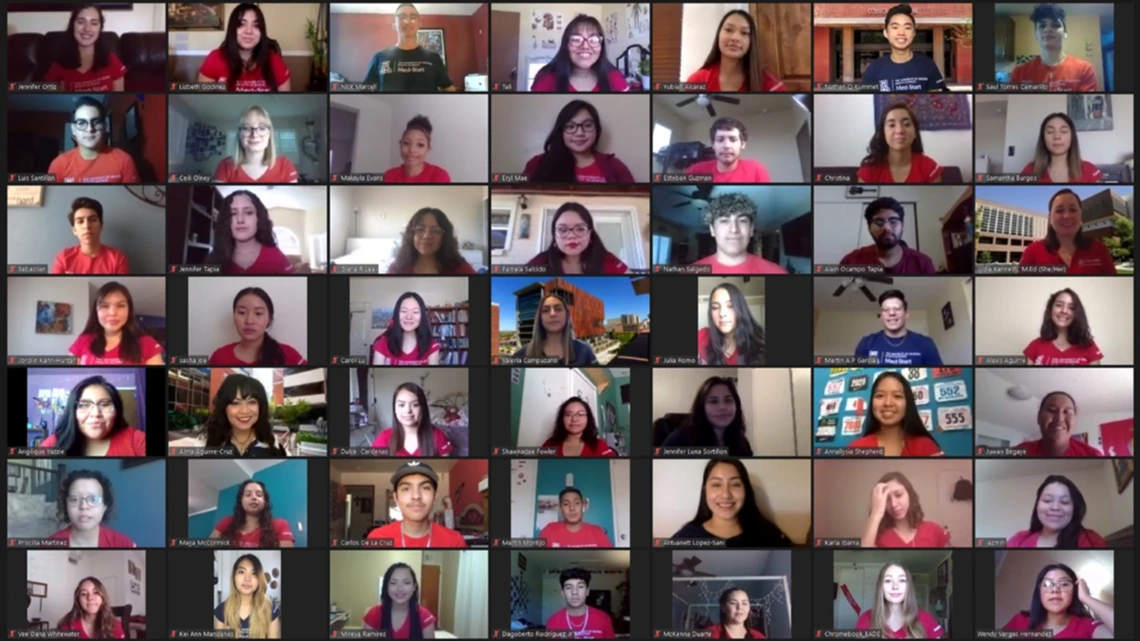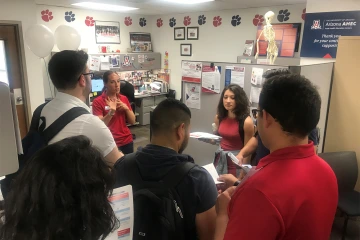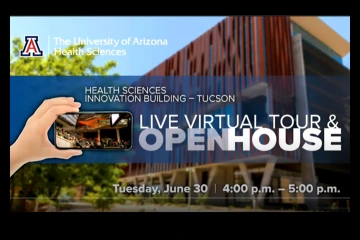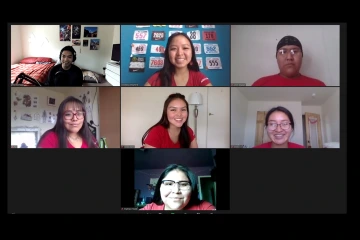COVID-19 Couldn’t Stop Med-Start
For the first time in five decades, the summer enrichment program used an online platform to immerse high school students in health careers.

In 2020, the pandemic forced the Office of Equity, Diversity and Inclusion to pivot to online summer programs. Here, Med-Start’s 42 participants are pictured with program organizers in a Zoom meeting.
Of the many successful outreach programs at the University of Arizona Health Sciences, Med-Start is one of the longest running. Founded in 1969, when the University of Arizona College of Medicine − Tucson was just two years old, the intensive six-week summer enrichment program draws underrepresented high school students from every corner of the state to immerse them in hands-on explorations of health professions.

2019 Med-Start students were the 50th class to experience the in-person program to learn about health education and careers.
When the COVID-19 pandemic hit earlier this year, the Med-Start team didn’t want to lose 50 years of momentum.
“We’re very fortunate that we were able to get our summer programs off the ground and online, and not miss a beat. Even though students couldn’t be on campus and have a residential experience, we maintained Med-Start’s essence — that experience we’ve had for the last 50 years,” said Lydia Kennedy, MEd, senior director of the UArizona Health Sciences Office of Equity, Diversity and Inclusion, which sponsors Med-Start. “We were working around the clock and on weekends, making sure these students have a successful, engaging, amazing experience.”
Kennedy is proud of her team and their partners, including the departments of English, mathematics and chemistry, for putting together an online summer program on such short notice.
“We had maybe a month and a half to put this all in place,” Kennedy said. “It was so much behind-the-scenes work! We made it happen, and the program was a huge success.”
Ensuring digital access for all participants
Offering a fully online summer program at short notice isn’t easy, and the “digital divide” presents even more obstacles. According to U.S. Census data, 17% of Arizona households don’t have an internet subscription — and this lack of access disproportionately affects underrepresented minorities, with Black and Hispanic households less likely to have internet or a computer than their white and Asian counterparts. On the Navajo Nation, two-thirds of residents lack broadband access, according to a recent report by NPR.

Virtual tours helped students experience campus life from afar, one of the adaptations for the 2020 Med-Start session.
“With AHEC guidance, we chose to use funding to support students to have digital inclusivity. Our 42 high school students received laptops, hotspots, subscriptions to Wi-Fi and the pen pad for math class,” Kennedy said. “We were intentional, and our partners were intentional, in ensuring we had digital inclusivity. Every single student was on an equal playing field.”
Courses in college preparedness, English, math and chemistry were converted to online formats, and other opportunities were reconfigured to be delivered remotely. For example, students took virtual tours of Health Sciences buildings and other universities, networked with health professionals via Zoom and learned hands-on medical skills at home with suturing kits received in the mail.
“Our students fared phenomenally. They showed grit, rigor, and were able to take on Med-Start online,” Kennedy said. “I’m proud of all they’ve accomplished virtually, and of their determination and dedication to complete Med-Start.”
‘Med-Start has given my summer a purpose’
Since it began, Med-Start has graduated more than 2,300 students. Francisco Moreno, MD, associate vice president for the Health Sciences Office of Equity, Diversity and Inclusion, says Med-Start never swayed from its original mission, which was to encourage high school students from underrepresented racial and ethnic groups, disadvantaged students, and students from rural areas to pursue careers in medicine and health sciences.

Working in teams, Med-Start students collaborated on projects and formed bonds.
While many in the Med-Start class of 2020 expressed sadness in not being able to meet in person, they said they still formed quick bonds with one another, even via Zoom.
“The power of Zoom is underappreciated for the laughs, smiles and jokes that I’ve shared. I’ve bonded with counselors, and I’ve met some amazing people my age from all over Arizona,” said Jennifer Ortiz of University High School in Tucson, and this year’s DuVal Award winner, which is given to the student who inspires their fellow classmates to reach their goals. “Med-Start brought me something to look forward to every day, and opened my mind to the possibilities in the medical field.”
“Med-Start has ignited my passion to serve in the health care field and become the best part of someone’s worst day.”Jennifer Ortiz, University High School student
Even working remotely, students received tutoring and other guidance from their counselors. They watched panel discussions and guest speakers, including medical students, practicing physicians and Med-Start alumni. Collaborating in teams, students tackled health problems affecting Arizona communities by putting together research projects and presenting their findings, using PowerPoint presentations and video. Outside of Zoom, students formed bonds and collaborated via email, Snapchat and TikTok.
“I loved the opportunity to connect over Zoom and other social media with fellow students who are so hilarious and dedicated, and work on projects with them,” said Carol Lu of University High School. “I’ve grown to deeply appreciate the vast world of medicine, and also the ability to find support in the teachers, the counselors and the organizers. Med-Start has given my summer a purpose and a shape during this crazy year of 2020.”

